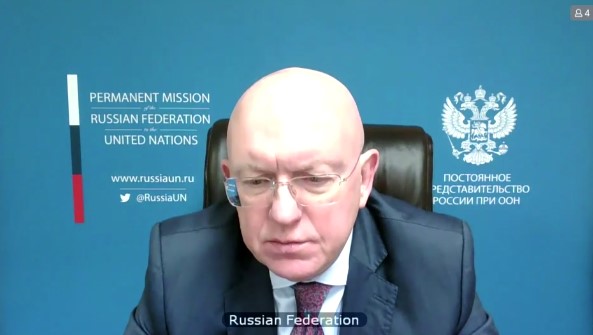Statement by Permanent Representative Vassily Nebenzia at an open VTC of UN Security Council members on the situation in Libya
Mr. President,
I cannot but express our regret over the continuing practice of virtual meetings that the Security Council uses to discuss issues of maintaining international peace and security. We all know that as recently as yesterday the General Assembly stepped up its openness by convening an in-person debate on the Middle East with participation of delegations that had arrived from abroad. The city of New York also has lifted some restrictions to fully open on 1 July. However, the Council keeps ignoring those trends, as if trying to hide from the international community.
We call upon the UNSC Presidency to take exhaustive measures in order to resume in-person meetings in the Security Council chamber that meets all relevant safety requirements.
Mr. President,
We thank SESG Kubiš for his briefing on the situation in Libya. We welcome the participation of the Permanent Representative of Libya Ambassador El-Sonni in this briefing. We thank Chair of the 1970 Sanctions Committee Ambassador Tirumurti for providing a review of the work of this subsidiary body. In this regard, we would like to express concern over the illegal arms trafficking in Libya – a factor that destabilizes the security situation both inside the country and in the Sahara-Sahel region. We underscore the importance of safeguarding Libya’s frozen assets. This issue becomes even more urgent in light of third parties’ attempts to profiteer from Libya’s resources. All questions pertaining to control of the oil infrastructure and export operations must be handled by Libyans themselves.
Mr. President,
We are cautiously optimistic about prospective developments in Libya. There has been considerable progress at the political track of the settlement. New power authorities have been formed for the transitional period – the Presidential Council and the Government of National Unity. In general, they could take over the authorities from former western Libya’s administration and the interim government that based in the east of the country. It was a landmark step towards resolving the prolonged acute crisis on the basis of a constitutional compromise between the opposing sides.
We hope that the Presidential Council and the Government of National Unity will be able to promptly establish the top-down executive structure, unify state bodies, financial and economic institutions, as well as the armed forces. Once successfully resolved, these tasks will ensure the necessary conditions for the constitutional referendum and general elections, scheduled for 24 December this year.
However achievement of these goals will not come easily. The odds are that given the heavy burden of Libya’s political and socio-economic problems the transitional period might take longer than expected. The most important thing Libyans are to do now is to overcome mutual distrust, caused by the many-year long conflict that was to a large extent provoked from the outside back in 2011. We remind our colleagues of this ordeal for which Libyans have been paying the price up until this day, and we call to abstain from interfering in internal affairs of independent states, including Libya.
Russia has contributed to the establishment of the ceasefire regime in Libya. We were among the first to welcome the establishment of transitional authorities – our Foreign Ministry issued a special statement on that matter. We will further stick to maintaining close contacts with the leading political forces of various Libyan regions. The recent progress of the political process can lead to success only when it becomes truly inclusive. The representatives of the former regime and of Libya’s eastern regions have an important role to play in this regard. Post-conflict state-building must not leave them behind.
Political settlement in Libya must not be an arena for international competition. We believe it is essential to take on board the opinion and interests of Libya’s neighboring countries, because they experience direct consequences of the ongoing crisis and can play a constructive positive role in promoting the peaceful settlement.
Mr. President,
On 16 April 2021 the Security Council unanimously adopted resolution 2570 that expands – as requested by the Libyan sides – the mandate of the UN Support Mission in Libya (UNSMIL). We proceed from the assumption that UN personnel must strictly follow its mandate that prescribes to monitor the ceasefire. All parameters of such monitoring must be acceptable for Libyans and negotiated with them.
Thank you.
